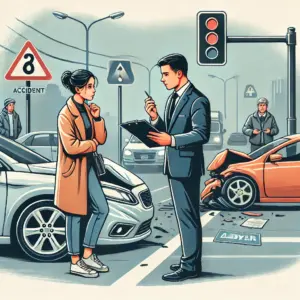
A car crash flips your day upside down in seconds. Beyond the shock and damage, you’ve suddenly got a list of things to handle—insurance, medical visits, paperwork, phone calls. It’s overwhelming, especially if you’re hurt.
But here’s the thing: What you do after the accident matters just as much as what happened during it. Miss a step, and you could seriously hurt your chances of getting the compensation you deserve. Let’s walk through the most common legal mistakes people make after a crash and what you can do to steer clear of them.
1. Not working with a car accident attorney
This is the biggest misstep, hands down. Many people try to handle things solo, thinking it’s just a matter of filing a claim and waiting for a check. Unfortunately, it’s rarely that simple.
Why it matters:
Insurance companies are not on your side. They’re trained to minimize payouts and close claims fast. Without the best car accident attorneys in your corner, you might not even realize how much your claim is worth or what you’re entitled to.
What to do instead:
Consulting an attorney doesn’t mean you’re suing anyone. It means protecting your rights. They’ll deal with the insurance company, gather evidence, and fight for the compensation you actually deserve, not just what’s convenient for the insurer.
2. Delaying medical treatment
You might feel “okay” right after a crash. But adrenaline can hide symptoms, and some injuries don’t show up until hours or days later.
Why it matters:
If you wait too long to get checked out, it weakens your case. Insurers will argue that your injuries aren’t serious or weren’t caused by the accident at all.
What to do instead:
Get examined as soon as possible. Whether it’s the ER, urgent care, or your primary doctor, having a medical record right after the crash is crucial. It documents your injuries and connects them directly to the accident.
3. Talking too freely to insurance adjusters
It’s tempting to be helpful when the other driver’s insurance company calls. But those conversations are not casual chats; they’re part of the company’s investigation.
Why it matters:
What you say can and will be used against you. Even a simple comment like “I’m feeling better” can be twisted to minimize your injury claim.
What to do instead:
Be polite, but cautious. You’re not required to give a detailed statement right away, especially not without legal advice. Stick to the basics—date, time, location—and leave the rest to your attorney.
4. Skipping documentation
When you’re shaken up, taking photos or writing things down might be the last thing on your mind. But solid evidence is your best protection down the road.
Why it matters:
Memories fade, and stories shift. Without photos, witness names, or a clear record of the crash scene, it’s your word against theirs.
What to do instead:
If you’re physically able, take pictures of the cars, license plates, road conditions, and any visible injuries. Jot down what happened while it’s fresh. Grab contact info from witnesses, too. It all helps build a stronger case.
5. Posting on social media
You might want to reassure friends you’re okay or share your frustration, but posting anything online after a crash is risky.
Why it matters:
Insurance companies and lawyers will look at your social media. A photo of you smiling at a friend’s BBQ could be used to argue that you’re not really injured.
What to do instead:
Keep things offline until your case is resolved. That includes posts, comments, and even tagged photos from friends. What might seem harmless to you could be used to weaken your claim.
6. Accepting the first settlement offer
After a car crash, money feels urgent. Medical bills are piling up, you might be out of work, and the insurance company is offering a check. It’s tempting to just take it and move on.
Why it matters:
Early offers are usually low. Once you accept, that’s it. You can’t go back for more, even if your injuries turn out to be worse than you thought.
What to do instead:
Wait until you fully understand the extent of your injuries and the long-term impact on your life. Talk to your doctor. Talk to your attorney. Make sure any settlement actually covers what you’ve lost, not just today, but long-term.
7. Failing to report the accident properly
Some people skip calling the police, especially if the damage looks minor. Others file a basic claim but leave out key details. Either way, poor documentation can come back to bite you.
Why it matters:
An official police report creates a neutral, third-party record of what happened. Without it, everything becomes harder to prove.
What to do instead:
Always report the accident to local authorities, no matter how small it may seem. And when you talk to your own insurer, be honest and thorough. The clearer and more consistent your story is, the better.
Play It Smart From the Start
After a crash, it’s easy to get overwhelmed. But small mistakes can snowball into big problems, especially when it comes to legal and financial outcomes.
The best way to protect yourself?
- Get medical attention quickly
- Keep records of everything
- Be careful who you talk to
- Don’t accept a settlement too fast
- And seriously—talk to a legal expert before making big decisions
You don’t have to navigate the mess alone. Taking a few smart steps now can save you a lot of stress (and money) down the road.







